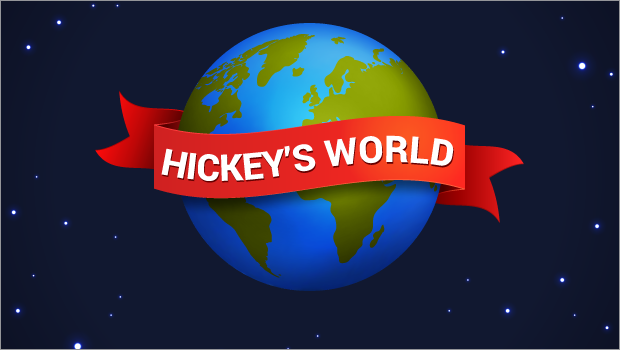The View from Hickeys World

I wrote this for the Irish Independent online recently, but it deserves a place on the blog:
We were in Maspalomas on holiday relaxing after a meal and our children had just left us to play when the shouting started. This guy was practically screaming at me across the restaurant and at first I couldn’t quite make out what he was saying. Then the words percolated through: “You’re ugly”, “bastard”, “People like you shouldn’t be here.”
It was obvious that my facial disfigurement was the cause of his diatribe. As he became more belligerent his wife tried to restrain him when he rose from his table to move in our direction. I quickly got over my own surprise and thought it best to leave and take my shocked wife with me.
This was the sort of incident I had hoped my wife would never witness, but I was grateful that at least our children hadn’t been present. So what triggered the hate-filled incident? Drink? Possibly, but perhaps his hostility and aggression were naked expressions of his true feelings. For my wife this was a real eye-opener, but for me it was just the latest in a line of hate crimes.
I’m used to people staring at me. They see my face and this chin which is actually a skin graft and they feel obliged to stare. They usually make no effort to hide their curiosity, sometimes following me along the street to get a better look. Someone ahead of me might look behind them, spot me, and then nudge their companions so that they also can take a peek. They might think they have the right to do so but they don’t.
Occasionally people are startled when they encounter me, their jaw dropping or eyes remaining wide open as if they had just met some kind of monster. It bothered me a lot when I was younger, discouraged me from doing the kinds of things others take for granted. The joys of being facially disfigured. Now I hardly noticed and it certainly doesn’t bother me. Mind you, there was a time when we visited Dublin Zoo and a bunch of girls ahead of us spotted me. We were then treated to the unusual sight of them walking backwards so they could continue staring. My family were upset, but at that stage I was comfortable with my scars and more concerned for my family.
I was around ten when I was attacked by a guy who lived near us. He used to taunt me in the street, calling me names he knew would hurt. It was clear my face bothered him, so much so that one day he cornered me, forced me to the ground, spat on my face and punched me. He wasn’t the only one. I was attacked in my teens several times, singled out because of my face. In my twenties I was chased by a gang who thought it was funny to call me “Dracula”, “spastic”, “monster” and “Frankenstein”. Words wound your psyche, punching holes in your self esteem, your dignity and confidence. They diminish your self worth and their effects linger long after physical blows. For some of us they lead to social isolation and anxiety. We are afraid to venture out because of these haters.
My wife was once accosted by a woman who wondered “What’s a lovely woman like you married to a guy like him?” Probably because she loves me and could see past my scars. You have to wonder why any woman would say such an insensitive thing to another. It’s clear she had written me off as one of life’s losers just because my face didn’t fit.
Just where does this hatred and intolerance spring from? Why do children grow into teenagers who abuse others in the street because of facial disfigurement or a disability? What gives them the right to decide we should be treated differently and it’s ok to abuse us openly, or laugh and sneer at us in public places? If it’s wrong to racially abuse someone then why is there no equal protection for the disabled and facially disfigured who are also targeted?
To fight disability hate crime we need to educate our children to be more tolerant. We can do this in the home and in school by nipping issues like staring, pointing and bullying in the bud. The media also has a crucial role to play by focussing less on negative words and imagery when they talk about the disabled or those with a facial difference. By perpetuating intolerance we ensure their exclusion from presenting TV shows (apart from Katie Piper in Britain), appearing on TV panels, etc.
Unfortunately we live in a world where cosmetic surgery is seen as a way to pursue physical perfection, a message that reinforces stereotypes about those of us who fall short of that ideal. Hollywood is also far from blameless. Its villains are usually deformed, crippled or facially disfigured, from Freddy Kreuger in Nightmare on Elm Street to Dracula, the baddies in James Bond films and Michael Myers in Halloween. The scars or deformities are meant to convey these guys are evil.
The vast majority of us may look different and have disabilities, but we have the same hopes and dreams as everyone else. We don’t expect to be treated differently, but how about treating us equally? We seek employment opportunities without discrimination; we want the right to go about our daily lives without being abused or attacked. Is that too much to ask?

